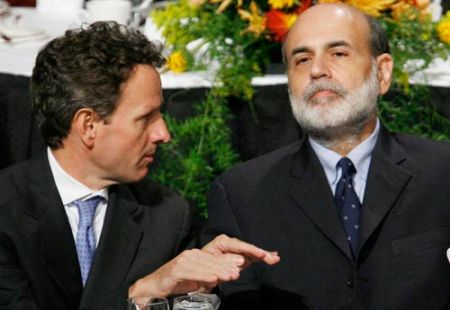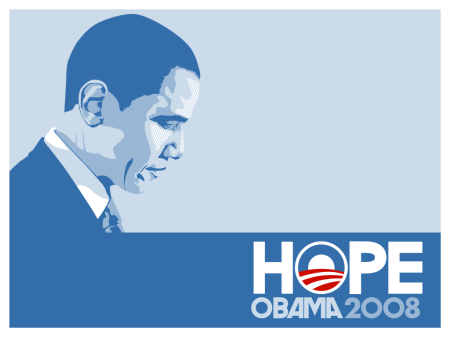Attending the left forum this year was a fine if exhausting time (The Pace University building’s design strategy of putting windows in the hallways but not the classrooms reminded me once again that I don’t understand modern architecture). The panels were numerous and varied, a high proportion sounded interesting, and the tiny proportion I attended were excellent. Read reports by more famous bloggers Louis Proyect and Richard Seymour of Lenin’s Tomb (who was also a speaker) here, here, and here. Doug Henwood’s talk is here, and a response here. Rather than give a report on every panel, I only want to concentrate on one basic theme, though one that has many twists and turns.
Which is, observations/predictions of the future of American (and more generally ‘Western’) ideology. Depending on who you ask, the end of neoliberalism will inevitably occur when the zombie march of bank bailouts and credit-fueled military adventures encounters its absolute limit with the collapse of the U.S. domestic economy (I am more skeptical). But whether or not neoliberalism as a more or less coherent strategy and set of policies is finished, the ideology of free market evangelism with the U.S. military as security hegemon is certainly ‘bankrupt,’ even in the most conservative press. What will replace it? This is implicitly also a question of what will be the new dynamic sector of the ‘global’ economy.
Let’s go with green technology and green jobs, just because it appears to be the only sane choice. Iain Boal reminded us that not even objective necessity necessarily guarantees anything: Obama’s energy secretary Steven Chu is pitching the environmental crisis as an engineering problem to be solved in large part by heavy investment in synthetic biology and biofuels — which unfortunately seem to be an unconvincing proposition for Wall Street, driving a number of the biofuel distilleries into bankruptcy. Nuclear would seem to be the most economically feasible option at this point at the rate politicians keep cautiously talking it up. But while solar power doesn’t seem to be doing much better than biofuel, neither does nuclear (let’s just not bring up coal). One is inevitably reminded of Carter’s failed attempt at an eco-revolution in the ’70s…and then one must think about something else.
So let’s say the socialists are right, and freedom doesn’t work. Say someone at the top finally figures that out, or is forced to from below, and we get our Green New Deal. Where’s the other shoe? Seymour was part of a panel on market ideology’s better half: human rights (here‘s one of his many posts on the subject). Historian Samuel Moyn argued that key components missing from human rights (and present in Enlightenment formulations of natural/universal rights) are those that involve social and economic rights, and strong support for the political right of self-determination — by the 1970s, any pretense of these older concerns had fallen away, a development coinciding with the rise of ‘free market,’ dollar-regime-driven neoliberalism. He described human rights as a form of Victorian philanthropic ideology, a sort of ‘realism’ which functions to deny the possibility of any solution to mass suffering beyond charity while justifying violent military intervention as needed. During the Q&A, someone asked if a much-speculated-upon shift to realpolitik would negate future Clinton-style humanitarian intervention. The answer that this is the script that typically follows the period of adventurist ‘idealism’ — “we tried to give them freedom, but clearly all they’re capable of is stability” — seems convincing enough. Human rights should not be understood as the basis for policy. Though it sometimes returns as blowback (i.e. Guantanamo and the Gaza strip) the framework seems vague enough to remain nonbinding, regardless of how aggressive the state is in using it as a pretext for war.
The construction of this emerging narrative, centering around a global reduction of aspiration, seems basically to involve the throwing up of ghosts of the past in the hopes that something will stick. From where I’m sitting, they focus around three major genres: the 1930s (depression, FDR as iconic patriarch and healer of class conflict), the 1970s (energy crisis, green whatnot) and finally the 1890s. The flipside to Victorian philanthropy is Victorian imperial administration, as (self-consciously) personified by Robert Kagan in this recent piece. Here he is reading the ruling class its horoscope:
“Realist” is now a mark of respect, “neocon” a term of derision. The Vietnam analogy has vanquished that of Munich. Thomas Hobbes, who extolled the moral benefits of fear and saw anarchy as the chief threat to society, has elbowed out Isaiah Berlin as the philosopher of the present cycle. The focus now is less on universal ideals than particular distinctions, from ethnicity to culture to religion. Those who pointed this out a decade ago were sneered at for being “fatalists” or “determinists.” Now they are applauded as “pragmatists.” And this is the key insight of the past two decades—that there are worse things in the world than extreme tyranny, and in Iraq we brought them about ourselves. I say this having supported the war.
So now, chastened, we have all become realists. Or so we believe. But realism is about more than merely opposing a war in Iraq that we know from hindsight turned out badly. Realism means recognizing that international relations are ruled by a sadder, more limited reality than the one governing domestic affairs. It means valuing order above freedom, for the latter becomes important only after the former has been established. It means focusing on what divides humanity rather than on what unites it, as the high priests of globalization would have it. In short, realism is about recognizing and embracing those forces beyond our control that constrain human action—culture, tradition, history, the bleaker tides of passion that lie just beneath the veneer of civilization. This poses what, for realists, is the central question in foreign affairs: Who can do what to whom?
And then comes the form of this harsh, purifying knowledge, the new science of society:
And of all the unsavory truths in which realism is rooted, the bluntest, most uncomfortable, and most deterministic of all is geography.
Bureaucratic and economic networks alike find their real ontological ground in the ground itself. The most natural of social sciences provides a new language of globalization, a new way to bypass the claims of rogue and ‘failed’ states. Kagan renders computer and even trade networks phobic. Always open to contamination by nuclear arms, terrorist hate, and uncontrolled populations against which the epidermal layer of national boundaries becomes less and less effective, the world is in need of a new kind of policing for which he will supply the transcendental logic. He counterposes his geographic/strategic realism to liberal humanism and universalism, slyly relying on its homnymy with economic liberalism, the very thing it was supposed to moderate, to bury economic reason even more deeply within the unconscious.
At the same time as it is political realism, we can also call Kagan’s positon the extreme right wing of the new environmental movement: the uninhibited revival of Malthus and MacKinder, the elimination of history in favor of directly using terrain and resource control as a way of controlling political ‘realities.’ As long as we don’t forget the role a certain kind of liberal environmentalism plays in legitimizing its right wing counterpart, keeping both in play for actual decision makers to employ whenever it suits them. The last generation included figures like Paul “Population Bomb” Ehrlich and Garrett “Tragedy of the Commons” Hardin. The key feature of this group is not so much the metaphysical Malthusian assumptions about fixed population growth rates and absolute ‘carrying capacity’ (though those are, amazingly, a recurring problem), but the idea that nature contains social laws we are obligated first to discover and then abide by. My suspicion is that Jared Diamond is the new chief spokesperson, but I haven’t read enough to say much more than that.
Again though, what someone like Kagan offers to the world’s bosses is not a set of rules to follow or ideal solutions to implement, but something more like freedom of movement — ideological flexibility.
Regardless of how the economic crisis is solved, or even if it’s not, it seems to me hopelessly naive at this point to think that a good solution will be arrived at through right argument. A proposal along these lines is just a potential tool with a certain set of use-values. The more easily it can travel, the more comprehensive it is, the more easily it lends itself to use by the most powerful as ideology. Doug Henwood and David Harvey’s hand waves toward “creeping socialism” at the conference, where alternatives to capitalist institutions are designed and employed at the local level, more or less gradually displacing existing structures — coupled with occasional campaigns to shift policy in more favorable directions — still seems like the most effective way to build the base that everyone on the left knows we don’t have. Without the capacity to realize them ourselves, all our great ideas are just fodder for the open source think tank.






 Obamaniac Radmatism (With a Double Shot of Espresso)
Obamaniac Radmatism (With a Double Shot of Espresso)



